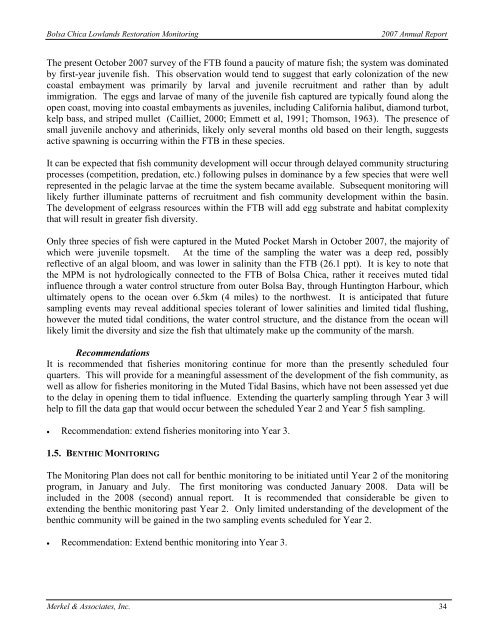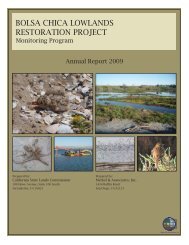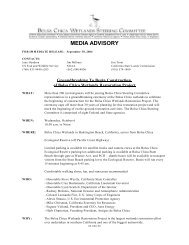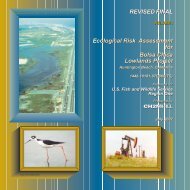2007 Annual Monitoring Report (pdf 16MB) - Bolsa Chica Lowlands ...
2007 Annual Monitoring Report (pdf 16MB) - Bolsa Chica Lowlands ...
2007 Annual Monitoring Report (pdf 16MB) - Bolsa Chica Lowlands ...
- No tags were found...
You also want an ePaper? Increase the reach of your titles
YUMPU automatically turns print PDFs into web optimized ePapers that Google loves.
<strong>Bolsa</strong> <strong>Chica</strong> <strong>Lowlands</strong> Restoration <strong>Monitoring</strong><strong>2007</strong> <strong>Annual</strong> <strong>Report</strong>The present October <strong>2007</strong> survey of the FTB found a paucity of mature fish; the system was dominatedby first-year juvenile fish. This observation would tend to suggest that early colonization of the newcoastal embayment was primarily by larval and juvenile recruitment and rather than by adultimmigration. The eggs and larvae of many of the juvenile fish captured are typically found along theopen coast, moving into coastal embayments as juveniles, including California halibut, diamond turbot,kelp bass, and striped mullet (Cailliet, 2000; Emmett et al, 1991; Thomson, 1963). The presence ofsmall juvenile anchovy and atherinids, likely only several months old based on their length, suggestsactive spawning is occurring within the FTB in these species.It can be expected that fish community development will occur through delayed community structuringprocesses (competition, predation, etc.) following pulses in dominance by a few species that were wellrepresented in the pelagic larvae at the time the system became available. Subsequent monitoring willlikely further illuminate patterns of recruitment and fish community development within the basin.The development of eelgrass resources within the FTB will add egg substrate and habitat complexitythat will result in greater fish diversity.Only three species of fish were captured in the Muted Pocket Marsh in October <strong>2007</strong>, the majority ofwhich were juvenile topsmelt. At the time of the sampling the water was a deep red, possiblyreflective of an algal bloom, and was lower in salinity than the FTB (26.1 ppt). It is key to note thatthe MPM is not hydrologically connected to the FTB of <strong>Bolsa</strong> <strong>Chica</strong>, rather it receives muted tidalinfluence through a water control structure from outer <strong>Bolsa</strong> Bay, through Huntington Harbour, whichultimately opens to the ocean over 6.5km (4 miles) to the northwest. It is anticipated that futuresampling events may reveal additional species tolerant of lower salinities and limited tidal flushing,however the muted tidal conditions, the water control structure, and the distance from the ocean willlikely limit the diversity and size the fish that ultimately make up the community of the marsh.RecommendationsIt is recommended that fisheries monitoring continue for more than the presently scheduled fourquarters. This will provide for a meaningful assessment of the development of the fish community, aswell as allow for fisheries monitoring in the Muted Tidal Basins, which have not been assessed yet dueto the delay in opening them to tidal influence. Extending the quarterly sampling through Year 3 willhelp to fill the data gap that would occur between the scheduled Year 2 and Year 5 fish sampling. Recommendation: extend fisheries monitoring into Year 3.1.5. BENTHIC MONITORINGThe <strong>Monitoring</strong> Plan does not call for benthic monitoring to be initiated until Year 2 of the monitoringprogram, in January and July. The first monitoring was conducted January 2008. Data will beincluded in the 2008 (second) annual report. It is recommended that considerable be given toextending the benthic monitoring past Year 2. Only limited understanding of the development of thebenthic community will be gained in the two sampling events scheduled for Year 2. Recommendation: Extend benthic monitoring into Year 3.Merkel & Associates, Inc. 34






